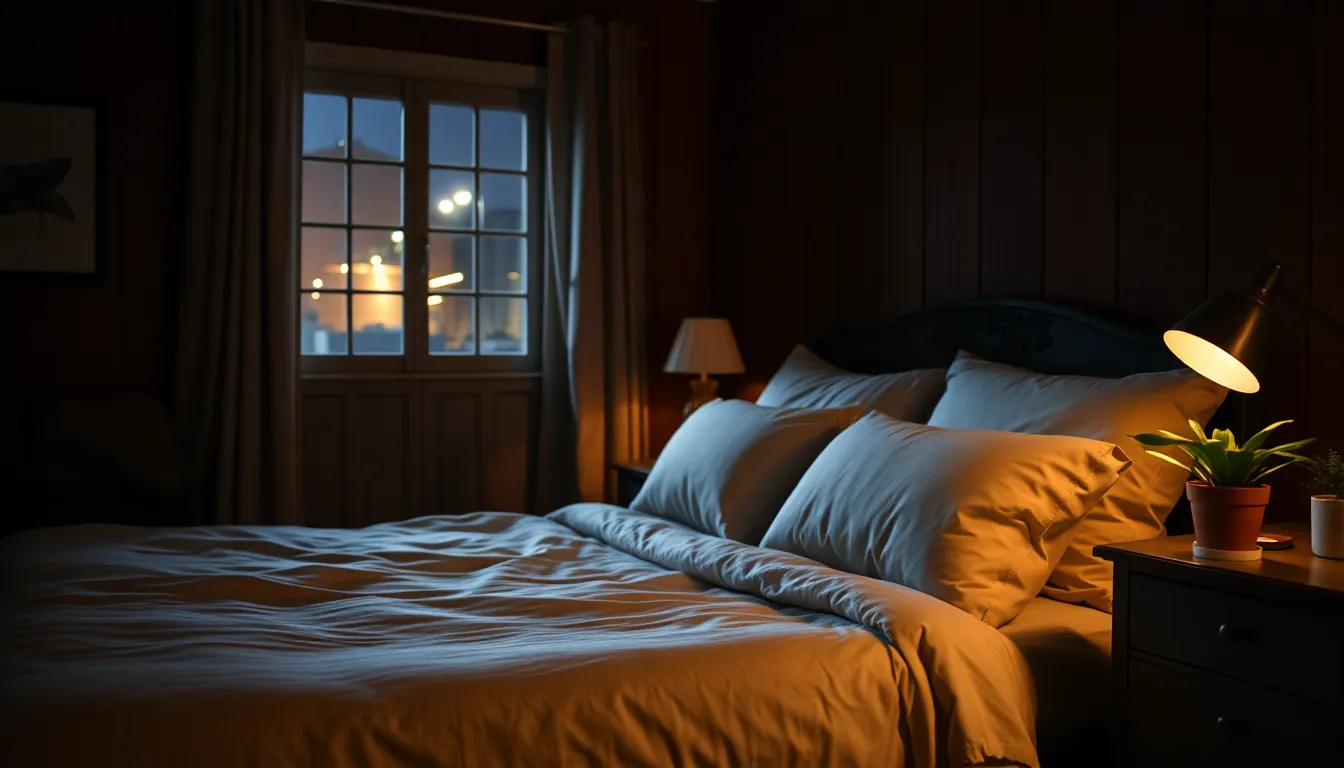Table of Contents
ToggleWhen the sun sets and the world quiets down, some find themselves wrestling with thoughts that just won’t let them sleep. Sleep anxiety can feel like a relentless game of tag, where the only thing being chased is a good night’s rest. It’s a common struggle, but the good news is that help is just around the corner.
Understanding Sleep Anxiety
Sleep anxiety affects a significant number of individuals, manifesting as an overwhelming fear and apprehension about the inability to fall asleep. People experiencing sleep anxiety often feel intense worry about the consequences of not sleeping, which can lead to a vicious cycle of sleeplessness and stress.
Common symptoms include difficulty falling asleep, frequent awakenings during the night, and racing thoughts when attempting to relax. Those who struggle with sleep anxiety may also notice physical symptoms such as a rapid heartbeat, sweating, or muscle tension. This heightened state of alertness makes it challenging to unwind.
Environmental factors contribute to sleep anxiety. An uncomfortable sleeping environment, excessive noise, or unregulated light can exacerbate feelings of anxiety. Such disturbances may keep individuals in a heightened state of vigilance, making sleep hard to achieve.
Cognitive factors play a crucial role too. Negative thought patterns and misconceptions about sleep can influence one’s ability to relax when it’s time to sleep. Individuals might convince themselves that they must sleep perfectly, leading to increased performance anxiety.
Effective coping strategies exist. Practicing relaxation techniques such as mindfulness, deep breathing, and progressive muscle relaxation can ease anxiety and promote a sense of calm. Establishing a consistent bedtime routine helps signal the body that it’s time to wind down and prepares the mind for sleep.
Understanding these elements lays the groundwork for addressing sleep anxiety. Recognizing feelings surrounding sleep can empower individuals to seek targeted interventions, transforming their relationship with sleep for better rest and recovery.
Causes of Sleep Anxiety

Sleep anxiety stems from various factors that contribute to its development. Understanding these causes can aid in addressing the issue effectively.
Psychological Factors
Psychological factors often play a significant role in sleep anxiety. Individuals experiencing high levels of stress may find their minds racing at night, making it difficult to unwind. Fear of sleeplessness can create a cycle of anxiety, where the pressure to fall asleep intensifies. Cognitive distortions, such as thinking sleep is essential for performance or productivity, often amplify concerns. Negative self-talk can further exacerbate feelings of inadequacy related to sleep. Treatment for these concerns frequently involves cognitive behavioral therapy, which aims to reshape thought patterns and reduce anxiety.
Environmental Factors
Environmental factors can also trigger sleep anxiety. An uncomfortable mattress or noisy surroundings often disrupts one’s ability to relax. Excessive light in the bedroom, whether from streetlights or screens, can impede the sleep-wake cycle. Extreme temperatures, either too hot or too cold, may create discomfort that hinders sleep efforts. Additionally, a cluttered environment can increase stress levels, making it harder to achieve a peaceful state of mind. Addressing these environmental issues through modifications helps foster a more conducive atmosphere for restful sleep.
Effective Strategies for Sleep Anxiety Help
Effective strategies exist to manage sleep anxiety. Implementing these approaches can significantly enhance sleep quality.
Relaxation Techniques
Relaxation techniques can minimize anxiety. Practices like mindfulness bring awareness to the present moment. Deep breathing exercises lower cortisol levels, promoting calmness. Progressive muscle relaxation reduces physical tension by systematically relaxing muscle groups. Guided imagery, where one visualizes peaceful scenes, can create a mental escape. These methods help shift focus away from anxious thoughts, paving the way for restful sleep.
Lifestyle Changes
Lifestyle changes foster a healthier sleep environment. Establishing a consistent sleep schedule cues the body for rest. Reducing caffeine intake in the afternoon prevents energy spikes during bedtime. Engaging in regular physical activity enhances sleep quality by promoting fatigue. Creating a comfortable sleep setting, including a dark and cool room, supports relaxation. Limiting screen time before bed reduces exposure to blue light, which interferes with melatonin production. These adjustments contribute to improved sleep patterns.
Professional Treatment Options
Professional treatment options offer valuable resources for managing sleep anxiety. These treatments can significantly improve sleep quality and reduce anxiety levels.
Therapy Approaches
Cognitive Behavioral Therapy for Insomnia (CBT-I) addresses the thoughts and behaviors contributing to sleep anxiety. This therapy focuses on altering negative thinking patterns about sleep, helping individuals develop healthier perspectives. Exposure therapy gradually exposes individuals to their fears related to sleep, reducing the anxiety over time. Another effective option is mindfulness-based stress reduction (MBSR), which promotes relaxation and mindfulness practices. Therapists may also recommend other support methods, such as group therapy or individual counseling, to guide clients through their anxiety experiences.
Medication Options
Healthcare professionals may prescribe various medications to alleviate sleep anxiety symptoms. Antidepressants, such as selective serotonin reuptake inhibitors (SSRIs), can help manage anxiety levels. Additionally, benzodiazepines offer short-term relief for severe anxiety and insomnia. While these medications can be effective, they may carry risks of dependence and should be used under a physician’s supervision. Non-benzodiazepine sleep aids provide another alternative for those needing temporary assistance. Each option should be carefully discussed with a healthcare provider to ensure a safe and effective treatment plan tailored to individual needs.
Overcoming sleep anxiety is a journey that requires patience and the right strategies. By understanding its causes and implementing effective coping techniques, individuals can reclaim restful nights. Creating a supportive sleep environment and adopting healthy habits play crucial roles in this process.
For those struggling significantly, seeking professional guidance can provide tailored solutions that address unique challenges. Empowerment comes from taking proactive steps toward better sleep. With determination and the right resources, restful sleep is within reach.




